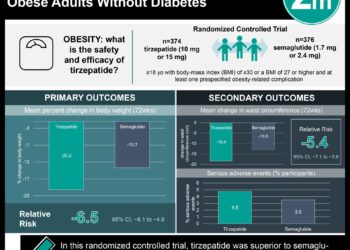European primary care lacks confidence in obesity management
Image: PD
1. Despite 85.5% of respondents stating that obesity management was essential to primary care, only 21.4% felt competent in their obesity intervention skills.
2. Overall, primary care providers (PCPs) desired more training and noted their lack of ability with respect to dietary counseling.
Study Rundown: While PCPs are in a unique position to offer guidance and follow-up on weight management, there has been little international research investigating the factors involved in obesity counseling. The first of its kind to examine international obesity counseling practices and perceptions, this study used a self-report questionnaire to gather information from 1119 PCPs in France, Italy, Ukraine, and Poland. The survey measured responses to questions regarding perceptions of PCP role in obesity management, the frequency of weight, height and BMI tracking, availability of weight management programs, and physicians comfort with several aspects of obesity management. Results showed that PCPs vary in their opinions of the importance of obesity management in primary care practice, have low confidence in their dietary management skills, and indicate a desire to be trained. Limitations to the study include low response rate, reliance on self-reporting, and selection bias. The results display international differences between perceived important for PCPs to manage obesity in daily practice, their perceived abilities in dietary counseling, and may indicate a potential avenue to target the obesity epidemic through advanced clinician training in dietary management.
Click to read the study in Pediatrics
Relevant Reading: Interventions for treating obesity in children
In-Depth [cross-sectional survey]: A 26-item, self-administered questionnaire was offered to 3464 PCPs, including family medicine and pediatric physicians, in Ukraine, Poland, France, and Italy. 1119 (32.4%) responded. There were significant differences in gender and specialty of respondents between nations. Overall, 85.5% of PCPs felt that obesity was relevant to primary care, though there were significant differences between the four countries surveyed, with 100% of Italian physicians believing it be relevant compared to 94.2% of French PCPs, 87.6% of Polish PCPs, and 60.3% of those from Ukraine (p<.0001). In total 21.4% of respondents felt competent in obesity management. 56.1% of PCPs surveyed felt comfortable with the dietary management of obesity. 61.7% wanted to receive advanced training in dietary management. Other significant differences between countries included the availability of weight-management programs, rates of regular height, weight and BMI measurements and plotting, and rates of referral for obesity.
By Laurel Wickberg and Leah H. Carr
More from this author: Acellular Pertussis vaccine less effective than whole-cell vaccine Teens who text and drive take other driving risks TV associated with higher BMI in teens American Academy of Pediatrics updates its Medicaid Policy Statement Children with infected family/classmates more likely to contract warts
© 2013 2minutemedicine.com. All rights reserved. No works may be reproduced without written consent from 2minutemedicine.com. Disclaimer: We present factual information directly from peer reviewed medical journals. No post should be construed as medical advice and is not intended as such by the authors or by 2minutemedicine.com. PLEASE SEE A HEALTHCARE PROVIDER IN YOUR AREA IF YOU SEEK MEDICAL ADVICE OF ANY SORT. Content is produced in accordance with fair use copyrights solely and strictly for the purpose of teaching, news and criticism. No benefit, monetary or otherwise, is realized by any participants or the owner of this domain.






